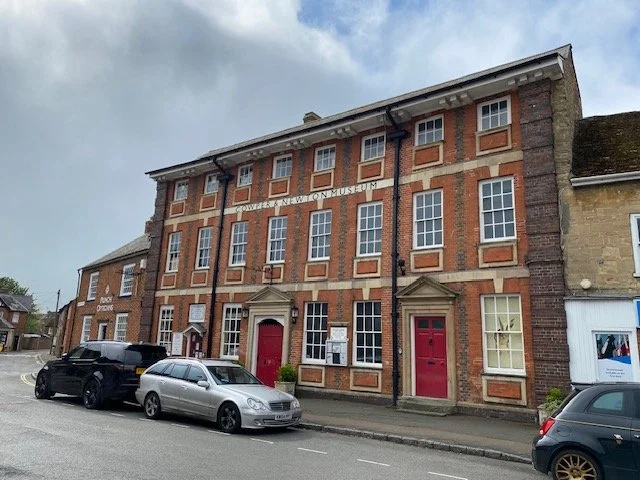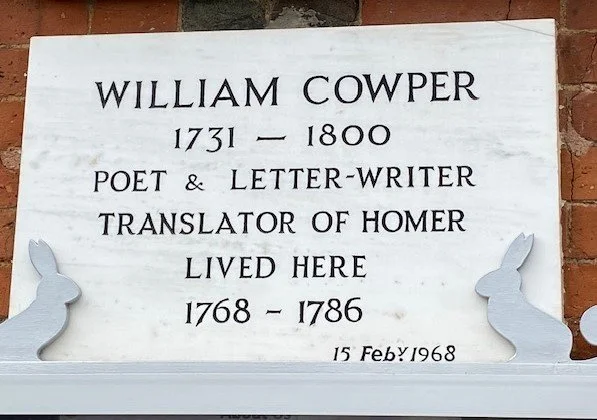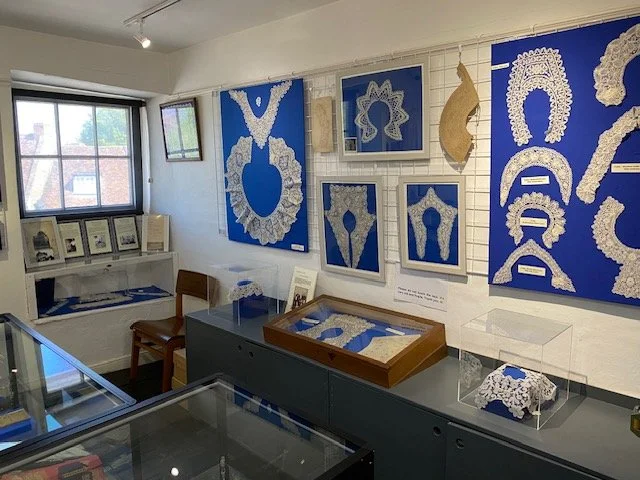Cowper and Newton Museum
Olney is a lovely market town in the north of Buckinghamshire, close to Northamptonshire and Bedfordshire. During the Civil War, it achieved some fame with the Battle of Olney Bridge in 1643. Prince Rupert marched on Olney intending to continue on to Newport Pagnell, taking the Olney forces by surprise and the Parliamentarians retreated to the bridge, just between Olney and Emberton, where they made a defiant stand. Although the Royalists could have won, a rumour that Oliver Cromwell’s reinforcements were nearby made them retreat and the battle was over.
Visitors to the town cannot fail to notice the references to pancakes- indeed, a visit to the Olney Pancake Parlour is a must- and this is because of the famous pancake race which takes place here every year. No one really knows the origin of this tradition. In one story, on hearing the Church bell, a housewife rushed to the Church still clutching her frying pan containing a pancake. Another tale suggests that the gift of pancakes may have been a bribe to the Ringer, or Sexton that he might ring the bell sooner. However it started, the people of Olney proudly uphold the custom to this day!
Olney also has a strong connection to the production of bobbin lace. It is thought that lacemakers from the continent came to this area from the late 1500s through to the late 1600s as a result of religious persecution in their own countries. The lacemakers, particularly those from Lille and Mechlin, settled in Olney, teaching the local women to make bobbin lace. Walking around the town, it is possible to see traces of this past.
In the late 18th century, Olney was home to two famous residents, the poet William Cowper who lived in Olney from 1767 to 1786, and John Newton, who was the town’s curate from 1764 to 1780. Newton is credited with writing the hymn, ‘Amazing Grace’ and the two men collaborated to write the ‘Olney Hymns’.
Cowper's former home, which was given to the town in 1905, now houses The Cowper and Newton Museum, dedicated to these men and their work. Cowper suffered from depression and moved to this quiet village when in his thirties. Once here, he adopted three leverets which became very important to him- and became almost as famous as he was!
Cowper enjoyed gardening and it is a pleasure to wander round the restored walled garden and see the little summer house where he did his writing and enjoyed reading. It’s a tiny space and apparently became a site of pilgrimage after his death with visitors signing the walls!
The house is beautifully laid out with so much to look at and plenty of information boards. When challenged by a friend, Cowper wrote a (very long!) poem about the sofa (pictured above)! Information about life in Georgian England is explored with examples of clothing and you can visit the bedroom where William wrote his popular poem, ‘The Diverting History of John Gilpin’.
One room explores John Newton’s experiences at sea and his participation in the slave trade, a shocking contrast to the rest of the house. His journey from slave ship captain to abolitionist is charted in this room and there is another room in the house dedicated to his life as the curate of St Peter and St Paul in Olney.
Almost at the top of the house is The Lacemakers’ Room. Set up to tell the story of the lacemakers of Olney and the surrounding villages, it is full of information, lace and lacemaking equipment. For anyone interested in lacemaking, this is a fascinating place to spend time.
Exquisite pieces of lace and prickings are displayed along with pictures and photos of the lace makers and their work. Cowper and Newton helped to support the lacemakers when they were struggling due to the decline of the industry so this room reflects that link as well as celebrating Olney’s lace making past. The museum is well worth visiting for this room alone; however, before making the trip, it is worth being aware that there are many steps and uneven floors to navigate in order to reach this room. A portfolio of photographs of the exhibits in the upper rooms is available and videos about the museum are available to watch in the Shop and Viper Barn, but I didn’t look at these and so cannot comment on how much of the Lacemakers’ Room is covered by this.
I was disappointed that I wasn’t able to buy a bobbin as a souvenir of my visit, but this didn’t spoil my enjoyment of this lovely museum. Well worth a visit!
Orchard Side
Market Place
Olney
Bucks
MK46 4AJ
You can read about Olney’s independent bookshop, The Snug Bookshop, here.
























